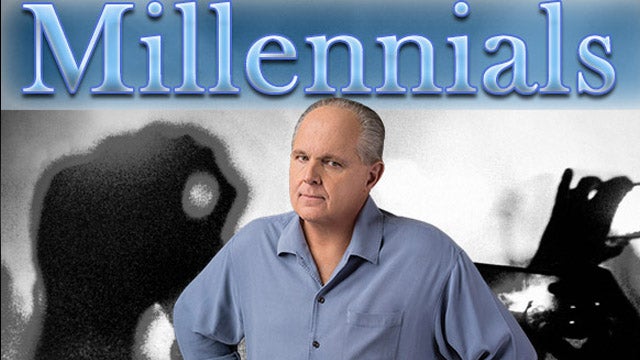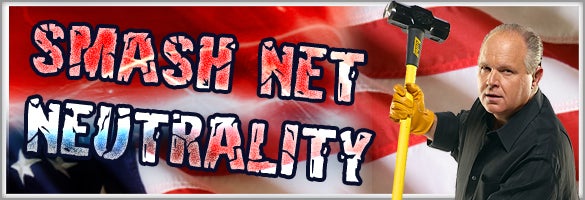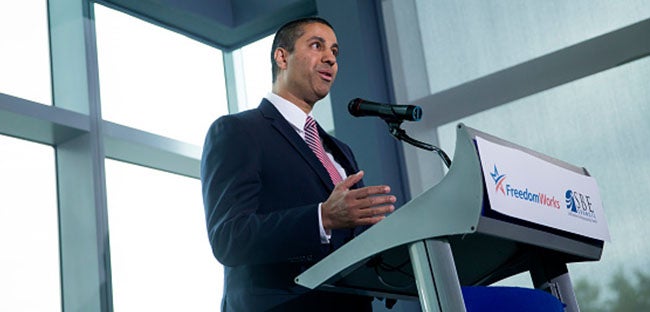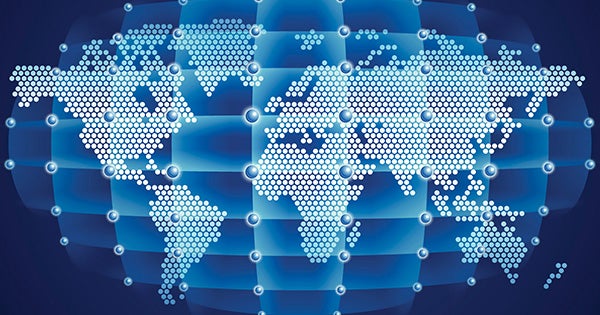RUSH: Now, ladies and gentlemen, the subject of net neutrality, as you know, is something that is highly interesting to me. I know to a lot of people it remains this big gray area of confusion. “What is it? What does it matter? How have I been affected by net neutrality or no net neutrality?” This is one of the aspects of it that is beneficial to the left is that it seems innocuous and uninteresting and irrelevant. So what’s the big deal?
We’ve been three various stages of definition and explanation over the recent months on this. As you know, the… Well, you may not know. But prior to 2015 there was nothing called net neutrality. The internet was wide open up until 2015. And by “wide open,” it wasn’t regulated by the government. It wasn’t regulated by the FCC. The FCC regulates radio, television, cell phones. The government pretty much regulates anything to do with communications. But direct regulatory control over the internet itself did not exist.
And there isn’t a soul out there that will complain about the way the internet was up until 2015. Well, that’s not true, ’cause there are always whiners and moaners. But the fact that it was unregulated is why it grew so fast. It’s why so much is there. It’s why you can find anything you want on the internet. You can find any information, countless sources. It’s just burgeoning and it’s growing, and the fact that it’s unregulated has been a benefit to everybody. Well, liberals don’t like things that attract a lot of people that are not regulated.
 Liberals want the government in charge of everything. They want the government to be able to punish their enemies with regulation of whatever industry or behavior or what have you. Liberals bring to their daily existence a very anti-corporate bias, and so they want the government to regulate against corporations just to be able to do it. So Obama and his administration, the FCC, in 2015 declared the imposition.
Liberals want the government in charge of everything. They want the government to be able to punish their enemies with regulation of whatever industry or behavior or what have you. Liberals bring to their daily existence a very anti-corporate bias, and so they want the government to regulate against corporations just to be able to do it. So Obama and his administration, the FCC, in 2015 declared the imposition.
They decided they were gonna impose net neutrality. Of course, nothing has been more incorrectly named than net neutrality. The premise behind net neutrality was the internet was a mess. The premise was it was unfair. The premise was the big guys had all the benefits. The rich had more access than the poor and the middle class, and there was nobody looking out for the little guy on the internet. The little guy, like always, was getting the shaft. The little guy was being mistreated. The little guy was being overcharged and the little guy was being throttled!
The little guy was just basically being screwed by Comcast, by AT&T, by DirecTV, by any of the providers. They’re all universally hated and despised by the tech journalism community. But the Obama administration said, “This is great,” and what they claimed was that net neutrality was needed because it was unfair that there were more conservative websites than liberal or that the conservative sites were more popular. That was deemed to be unfair. You know how they go after Fox News and you know how they go after talk radio, claiming that we’re unbalanced here or that it’s just not right.
They own all the rest of the media. They own everything in TV except Fox News, and they can’t wait to get their hands on it to neuter it or (better yet) to eliminate it and wipe it out. They’ve been trying to do the same thing with talk radio. So their objective with net neutrality, long-term, was to be able to have the government determine which sites were being visited more often than others, and to somehow put limits on the popular conservatives. Now, this was never stated this way. It was never promised this way.
But there’s no other reason why Obama and his people would want control of the internet, other than to control and to regulate the content. The way they sold it to people was to say they were going to protect the little guy against predatory pricing by providers. Internet service providers, telecomms like Comcast or Verizon. They’re gonna make sure that little guy didn’t get the shaft. So for two years we had the beginnings of net neutrality, which really did nothing more than regulate the internet as a common utility like your power company, like the phone company. It put the government in charge of regulating any aspect of the internet that they wanted.
 When Trump was elected, Ajit Pai, who was an FCC commissioner, was named chairman, and the first thing he did was announce an end to this so-called net neutrality, because it’s not neutral at all. There’s nothing neutral about net neutrality. Neutral would be no regulation whatsoever, the market works. The sites that succeed are the sites that are the best and the most attractive and offered the best deals, like anything else in the free market. The left doesn’t trust the free market. They don’t like the free market. They want controls.
When Trump was elected, Ajit Pai, who was an FCC commissioner, was named chairman, and the first thing he did was announce an end to this so-called net neutrality, because it’s not neutral at all. There’s nothing neutral about net neutrality. Neutral would be no regulation whatsoever, the market works. The sites that succeed are the sites that are the best and the most attractive and offered the best deals, like anything else in the free market. The left doesn’t trust the free market. They don’t like the free market. They want controls.
So Pai came in and said it’s silly to regulate something this new and this modern, that’s this great, that is growing this fast, that’s creating this kind of economic boom and wealth, why regulate this the same way we’ve been regulating utilities since 1934? 1934 regulatory schemes have been the regulatory climate over the internet for the past two years. Trump and his FCC chairman decided to get rid of them, and the left went nuts. They absolutely went nuts.
They started protests all over the country. They showed up at Ajit Pai’s house. They were threatening his life and threatening his kids. He was supposed to speak this week in Vegas at the Consumer Electronics Show. He canceled it because of death threats that he’s been getting. All over deregulating the internet. Deregulating it, which is good for everybody. It’s the epitome of freedom. Now, there’s much more to this than what I have — I mean, it gets in the weeds. I could take it as deep in the weeds as I want to.
But one thing to keep in mind is that from the Obama administration and that kind of thinking, from their perspective, the real value in regulating the internet was down the road being able to regulate content and being able to make sure that no equivalent of conservative talk radio happened on the internet like it did on radio. And making sure that no internet version of Fox News happened on the internet like it did in cable news.
That was the ultimate purpose. But this was never stated. You would only know this if you know Obama and if you know liberals and if you listen to ’em and how much they hate talk radio now and hate Fox News and if they could wipe ’em both out, they would. And they wanted control of the internet to be able to prevent this kind of dominance should it pop up and happen.
 The way they got so many people to support it was to really disguise net neutrality as making sure your Netflix wasn’t throttled and to make sure that Netflix was always able to provide you with the proper speed so that you could watch without buffering. They always positioned this to Millennial consumers as the only way to make sure that what they were paying per month to Netflix and HBO Now and whatever else would provide them the guaranteed data stream they need to be able to watch this stuff and to prevent those companies from throttling them or overcharging them or what have you.
The way they got so many people to support it was to really disguise net neutrality as making sure your Netflix wasn’t throttled and to make sure that Netflix was always able to provide you with the proper speed so that you could watch without buffering. They always positioned this to Millennial consumers as the only way to make sure that what they were paying per month to Netflix and HBO Now and whatever else would provide them the guaranteed data stream they need to be able to watch this stuff and to prevent those companies from throttling them or overcharging them or what have you.
So it was earlier this week our friend Jonah Goldberg at National Review submitted a piece at the National Review Online Corner, which is their blog post. And his piece was rooted in he didn’t understand why all this tumult over net neutrality. He couldn’t understand why. I mean, to him this is an issue that is not even worth a couple of seconds of your time, and he couldn’t understand why the guy taking net neutrality regulations away was having his life threatened and why his kids were being threatened.
He wrote, “The thing I still don’t really understand is why the topic of net neutrality arouses this kind of passion in the first place. I could understand why troubled individuals in a state of crisis — say, stricken by cancer — or parents of sick children in need of some experimental treatment would go to such lengths to harass the head of the FDA. But the FCC? I mean, I could see — though not condone — someone threatening to murder an official’s family if they believed it would save their child’s life. But contemplating murder to prevent a phone company from charging less to bundle Netflix with your subscription? That’s just bizarre.”
By the way, that’s written correctly. When you eliminate these Title II regulations from 1934, internet prices would actually get cheaper, and the pro-net neutrality people don’t like that. It’s a convoluted thing. But Jonah’s right when he says contemplating murder of the FCC chairman to prevent a phone company from charging less to bundle Netflix with your subscription? It’s just bizarre.
He says, “We hear a lot about how Donald Trump’s rhetoric encourages incivility, bigotry, and even violence. It seems to me the press has done a terrible job holding politicians and activists to account for letting an obscure argument about Internet policy lead to such insanity.” And so he doesn’t understand why everybody’s so exercised by this. And I want to try to tell him why, and all the rest of you, because it is a curiosity.
 I mean, these people were literally threatening the lives of Ajit Pai and his family over 1934-era regulations being removed from the internet. I think there are a lot of factors here in understanding it, and all of them trace right back to liberalism. I hate to sound like a broken record on this, but the people doing this protesting, the people making these threats, the people going crazy over this, they’re primarily, I’d say 95% of ’em are Millennials. And to Millennials, the internet is their air and water. Their devices, their screens is their air and water. They cannot do without it.
I mean, these people were literally threatening the lives of Ajit Pai and his family over 1934-era regulations being removed from the internet. I think there are a lot of factors here in understanding it, and all of them trace right back to liberalism. I hate to sound like a broken record on this, but the people doing this protesting, the people making these threats, the people going crazy over this, they’re primarily, I’d say 95% of ’em are Millennials. And to Millennials, the internet is their air and water. Their devices, their screens is their air and water. They cannot do without it.
I’m not even talking about addiction. I’m not even referencing that. I’m just talking about as a cultural existence. You know how important air and water are to you. What if somebody came along and started regulating the amount of air you could breathe every day and you had to pay more once you’d reached your quota? That’s how these people are looking at it.
The question is, why? Why has the internet become the equivalent of life-sustaining organisms to them? And why is there such hatred for people that do business on the internet? And the answer to this is traceable back, who is it that has been raising these kids, these Millennials, and educating them, and what have they been taught as they’ve grown up?
The Democrat Party enemies list is corporate America. I mean, there are many enemies on it, but at the top of the list is corporate America. These young kids have grown up being told to hate major corporations, industries, entire industries, to distrust them. That they’re out to make their customers sick, that they’re out to kill their customers, in the cases of drug companies. I’ve gotta take a break here, but I want to get to the nub of this, because it’s a crucial element to understanding.
BREAK TRANSCRIPT
RUSH: They truly believe that internet service providers and telecomms want to charge them more than they can afford and that they will lose access to the internet unless the government is regulating these businesses and keeping them honest. They live in a mortal fear that the internet will somehow vanish from their control. They almost feel, these Millennial leftists feel like the internet, they have an entitlement to running it and organizing it and policing it and so forth.
 And that was what net neutrality was. That was their buddies, the Obama administration, American leftists regulating and running the internet under the auspices of protecting it for the little guy. It’s nothing but liberalism. Punish the successful, punish corporate America, treat them as the enemy and so forth, and a total fear and distrust of free and open markets.
And that was what net neutrality was. That was their buddies, the Obama administration, American leftists regulating and running the internet under the auspices of protecting it for the little guy. It’s nothing but liberalism. Punish the successful, punish corporate America, treat them as the enemy and so forth, and a total fear and distrust of free and open markets.
I don’t doubt some are bought and paid for to threaten Ajit Pai’s life, but I read enough of these people, this is genuine, they are genuinely exercised by this. They are losing their minds over it because they think they’re going to lose it. And it is their air and water to them. And you’ve got to really try to understand it from that perspective.
BREAK TRANSCRIPT
RUSH: Doug in Traverse City, Michigan. I’m glad you waited, sir. Welcome to our program.
CALLER: Hey, thank you, Rush. First I’d like to say MAGA dittos from my mom and dad who have been married over 60 years and have been lifelong listeners of your show.
RUSH: Thank you. Thank you very much. That’s the first MAGA dittos I’ve had in a while.
CALLER: Yes.
RUSH: Make America great again dittos is what that is.
CALLER: That’s right.
RUSH: Not mega, he said MAGA, Make America Great Again.
CALLER: That’s right.
RUSH: I caught it, even though I’m deaf, I caught it.
CALLER: Anyway, I was calling in about the net neutrality topic you brought up. A lot of online alternative media played a huge part of Trump’s success in getting elected, especially YouTube. YouTube, you can watch different personalities. They start up their own channel as they get more views and popular —
RUSH: You know who has one of the best YouTube channels going out there? JuJu Smith-Schuster of the Pittsburgh Steelers. This guy is great. This guy is a comedian. This guy, he did a bit, he dressed up as a phony TV news anchor, and he went around Pittsburgh as a phony news reporter with a wig and everything asking people what they thought of the hit on Vontaze Burfict of the Cincinnati Bengals or anything to do with the Steelers. It’s pretty good, the kid’s 20 years old, 21 years old, it’s hilarious. But you’re right, YouTube channels have been populated by a lot of great, young conservative people.
CALLER: But there’s been retribution on YouTube, though, for those conservative voices.
RUSH: Exactly!
CALLER: They started pulling episodes. They started demonetizing, which means they’re pulling advertising dollars —
RUSH: Right, after neutrality was implemented.
CALLER: Right.
RUSH: That’s when that began, exactly right. That guy that got fired at Google has sued Google. A massive class-action lawsuit. Do you know what this guy is alleging in this lawsuit? That Google almost put conservatives on trial in Google just for their thoughts. This is incredible. I’ve had it ready to go here for a couple days and didn’t get to it, so I guess I’ve committed myself to mentioning it tomorrow, which I have to do because there’s no more time left today.


